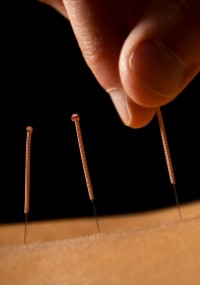New research concludes that acupuncture reduces anxiety and cravings in heroin addicts.  Another recent investigation may help to explain these findings. Researchers discovered that “Different frequencies of EA (electro-acupuncture) appear to activate different endogenous opioid mechanisms.” The combined investigations bolster evidence across many studies demonstrating that acupuncture is an effective tool for assisting addiction recovery.
Another recent investigation may help to explain these findings. Researchers discovered that “Different frequencies of EA (electro-acupuncture) appear to activate different endogenous opioid mechanisms.” The combined investigations bolster evidence across many studies demonstrating that acupuncture is an effective tool for assisting addiction recovery.
The study demonstrating acupuncture’s ability to reduce both anxiety and cravings in heroin addicts tested acupuncture points on the back. Many other studies have looked at arm acupuncture points such as Tian Wei, Tim Mi, LI5 and LU7. Another set of studies investigated auricular acupuncture and discovered that it is highly effective in addiction recovery. This study, however, investigated the Jiaji (EX-B2) acupuncture points of the back. The effectiveness of the Jiaji points were clinically measured against subjects in a control group that received Methadone and Doxepin.
A group of 60 patients suffering from heroin addiction were randomly divided into two groups. Group A received electroacupuncture at Jiaji points. Group B received Methadone and Doxepin. In an interesting finding, the acupuncture group had better clinical results than the medication group. The researchers concluded that, “Electroacupuncture at Jiaji (EX-B 2) points can effectively alleviate anxiety and craving intensity in heroin addicts during detoxification.”
The other recent study measured the ability of electroacupuncture to regulate opioids within the body. It was a meta-analysis of 2,916 human studies and 3,344 animal studies. Critics have argued that there have not been many studies on acupuncture but this meta-analysis underscores the vast amount of research that has already been completed. The investigators note that, “Acupuncture does release endogenous opioids….” They note that the evidence is very strong regarding electroacupuncture although there is also evidence demonstrating that manual acupuncture also has this effect. Perhaps the most intriguing aspect of the study is that variance in electroacupuncture frequencies of stimulation activate differing opiod mechanisms within the human biological system.
The studies into the effectiveness of acupuncture for addiction recovery have been peer reviewed and accepted many times over. Just last year, researchers concluded that acupuncture is effective for the treatment of withdrawal symptoms and anxiety associated with heroin addiction. A control group was compared with two acupuncture treatment groups. Group A received acupuncture at acupuncture point HT7 (Shenmen) and group B received acupuncture at acupuncture point P6 (Neiguan). The use of both points proved effective in the treatment of heroin addiction related withdrawal symptoms.
Acupuncture has also been measured for its effectiveness in the treatment of other forms of addiction including alcoholism, cigarette smoking and cocaine addiction. Although we have discussed clinical studies of humans, there has also been a great many laboratory studies. Researchers studying cocaine addicted laboratory rats discovered that acupuncture needling at HT7 (Shenmen), located on the arm, had a “markedly reduced reinstatement of cocaine-seeking.” The success rate was a surprising 86.5 percent inhibition rate.
The drive to conduct acupuncture research into its effectiveness relating to addiction recovery was largely stimulated by a Yale University investigation over decade ago. Researchers concluded that ear acupuncture was effective for the treatment of cocaine addiction. The results of the human subject controlled study demonstrated that the acupuncture group tested 54.8 percent free of cocaine while the two control groups were 23.5 percent and 9.1 percent free of cocaine following treatment. Moreover, the acupuncture group demonstrated a lower recidivism rate. These encouraging successes were later verified by thousands of other investigations.
References:
Mayor, David. "An exploratory review of the electroacupuncture literature: clinical applications and endorphin mechanisms." Acupuncture in Medicine (2013).
Mu, Jing-ping, Li Liu, Heng Liao, Huan-gan Wu, and Ping Xu. "Effect of electroacupuncture on anxiety and craving in heroin addicts during detoxification." Journal of Acupuncture and Tuina Science 11, no. 4 (2013): 244-247.

